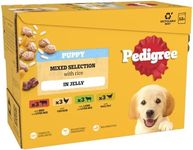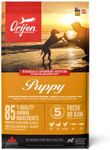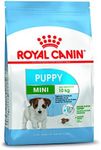Buying Guide for the Best Puppy Foods
Choosing the right puppy food is crucial for the healthy growth and development of your furry friend. Puppies have different nutritional needs compared to adult dogs, so it's important to select a food that supports their rapid growth and energy levels. When selecting puppy food, consider factors such as the breed size, age, and any specific health concerns your puppy may have. Always consult with your veterinarian to ensure you're meeting your puppy's dietary needs.Nutritional ContentNutritional content refers to the balance of proteins, fats, carbohydrates, vitamins, and minerals in the puppy food. This is important because puppies need a higher protein and fat content to support their growth and energy needs. Look for foods that have a protein content of at least 22% and fat content of at least 8%. If your puppy is very active or a larger breed, they may require even more protein and fat. Always check the label for a statement from the Association of American Feed Control Officials (AAFCO) to ensure the food meets the nutritional requirements for growth.
Breed SizeBreed size is an important factor because different sized puppies have different growth rates and nutritional needs. Small breed puppies grow quickly and may need more calorie-dense food, while large breed puppies grow more slowly and need food that supports healthy bone development. Choose a puppy food that is specifically formulated for your puppy's breed size to ensure they get the right balance of nutrients.
IngredientsThe ingredients in puppy food can vary widely, and it's important to choose a food with high-quality ingredients. Look for foods that list a high-quality protein source, like chicken or lamb, as the first ingredient. Avoid foods with excessive fillers like corn or soy, as these can be harder for puppies to digest. If your puppy has any allergies or sensitivities, you may need to choose a food with limited ingredients or a specific protein source.
Kibble SizeKibble size refers to the size of the dry food pieces. This is important because puppies have smaller mouths and may struggle with larger kibble. Small breed puppies typically need smaller kibble, while larger breeds can handle bigger pieces. Choose a kibble size that is appropriate for your puppy's breed to ensure they can eat comfortably and safely.
Life StageLife stage refers to the age range the food is formulated for. Puppy food is specifically designed for the growth stage, which is generally up to one year of age. It's important to feed your puppy food that is appropriate for their life stage to ensure they receive the right nutrients for growth and development. Transition to adult food once your puppy reaches maturity, which varies by breed.


















